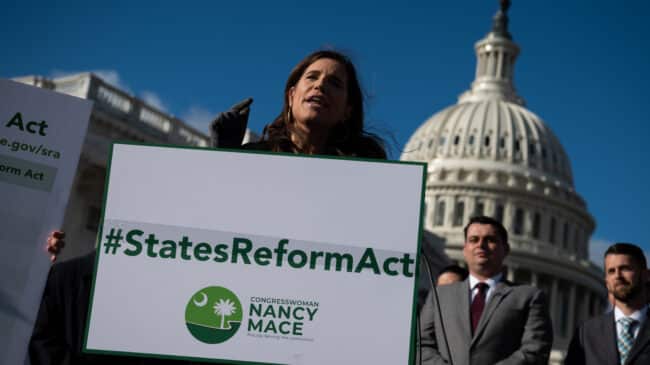While some individuals are legally making millions of dollars from cannabis sales in the booming marijuana industry, thousands of people who were once convicted of marijuana-related crimes are still in prison, or are out but cannot get jobs, housing, credit, or even participate in the legal cannabis industry because they still carry a felony on their records.
The States Reform Act (SRA), introduced this week by Rep. Nancy Mace (R-SC), would correct this by automatically expunging all non-violent federal cannabis crimes and releasing anyone from prison still serving on these charges. The proposed legislation would also make the possession of any amount of marijuana legal under federal law, as long as that marijuana is not related to a foreign drug cartel.
The main goal of the States Reform Act is to decriminalize cannabis and create a functional multi-state marketplace without any of the current federal conflicts, like marijuana businesses being denied banking services or patients being denied federally-assisted housing due to their state-licensed medical cannabis use. But decriminalization and legalization of marijuana should go hand-in-hand with expunging past cannabis-related criminal records, as it does in this newly introduced federal legislation.
A criminal record of any kind can be devastating to someone’s life. Decades after the failed drug war began, a record-high majority of the public has decided that cannabis should be legal. Those who engaged in cannabis activities before it was legal deserve what Mace’s bill aptly calls “a second chance” at complete re-integration into American society. Under the proposed law, the federal government would determine which cases are eligible and swiftly deliver justice to those people without charging them a fee.
Expungement is available in most states and the federal government for certain crimes. But the current expungement process for many states and the federal government can cost applicants up to $4,000, requires a lawyer, and often takes several months and a court hearing.
Research from Michigan, a state that requires an application and a fee for expunging records, finds just 6.5% of convicted individuals pursue expungement. The study found that similar states never had an uptake rate higher than 10%. This could be because many applicants are low-income and hesitant to interact with the criminal justice system that they feel has wrongly marked them as criminals.
The States Reform Act addresses this problem by automatically expunging all eligible marijuana-related records with no application or financial commitment from the defendant. This is the correct process for expungement because eligibility requirements imply that the government can determine from criminal records who is either eligible or not eligible for expungement. It no longer makes sense to have defendants line up one by one before a judge and have their cases formally dismissed.
The States Reform Act would only clear federal records and any state charges an individual obtained would still be present. States that have legalized cannabis should follow suit and automatically expunge all relevant records for activities that are now considered legal. This would deliver justice to the most people most effectively.
Determining which cases are eligible for automatic expungement is a delicate process because it is important that serial, violent criminals do not have their records erroneously expunged. The States Reform Act excludes any cannabis offenders who were agents of a cartel or have any other violent offenses, including driving under the influence infractions. These provisions deny expungement to anyone with an exclusionary designation as a threat to public safety. This winnowing process leaves defendants with only cannabis records who were doing activities that are now made legal or “would have resulted in a lesser offense” as eligible for automatic expungement.
As true laboratories of democracy, states across the country have legalized a wide range of activities related to cannabis use for years. Most states only allow for 28 grams of cannabis possession but others, like Michigan, allow 72 grams, and some states are still increasing their limits. Roughly 20 states now allow some form of limited home grow of 6-12 cannabis plants and most of those same states also have a “gift” law that allows for transfer but not for profit or commercial purposes. To enter into commercial sales requires obtaining a license, which can be extremely expensive, difficult, and unfortunately corrupt, depending on which state you are in.
Despite these facts, neither growing nor distributing cannabis was legal before 2012 when Colorado legalized it for the first time. Therefore many citizens engaged in activity that was at the time illegal but would now either be considered legal for private purposes or could occur in a commercial setting. It’s impossible to know how many of these people would have chosen to work in the cannabis industry or conduct a small legal small home grow, yet now have serious cannabis felonies on their records.
The process outlined in the States Reform Act would not be perfect and there will be many borderline cases in some eyes. Both prosecutors and citizens should reserve the right to appeal any case they feel was mishandled. But the default should be that all cannabis-related offenses are automatically expunged unless an exclusionary charge is found, and that is the standard the States Reform Act sets.
The States Reform Act would only apply to federal cases, but the bill would also lay the important legal groundwork for states that have been reluctant to engage in large-scale expungement operations even after legalizing a wide range of cannabis activities.
